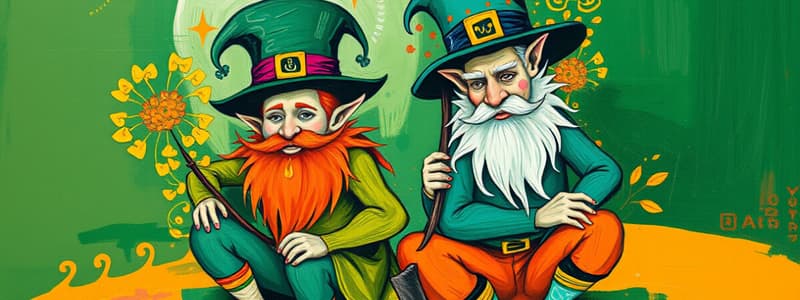Podcast
Questions and Answers
What was the man hoping to find when he approached the leprechaun?
What was the man hoping to find when he approached the leprechaun?
- A hidden treasure (correct)
- A magical wish
- A mythical creature
- A friend
Why did the leprechaun tie ribbons around all the trees?
Why did the leprechaun tie ribbons around all the trees?
- To mark all the trees
- To signal other leprechauns
- To confuse the man (correct)
- To decorate the forest
What did the man do to remember the location of the treasure?
What did the man do to remember the location of the treasure?
- Called for help
- Left a note behind
- Tied a ribbon around the tree (correct)
- Drew a map
Which of the following is a warning from the legend of leprechauns?
Which of the following is a warning from the legend of leprechauns?
What characteristic of leprechauns is highlighted in the tale?
What characteristic of leprechauns is highlighted in the tale?
What were leprechauns originally known to be?
What were leprechauns originally known to be?
What color were leprechauns originally depicted as wearing?
What color were leprechauns originally depicted as wearing?
What is one of the famous legends associated with leprechauns?
What is one of the famous legends associated with leprechauns?
How are leprechauns typically described in appearance?
How are leprechauns typically described in appearance?
What behavior is commonly associated with leprechauns?
What behavior is commonly associated with leprechauns?
Flashcards are hidden until you start studying
Study Notes
Leprechauns Overview
- Leprechauns are iconic figures in Irish folklore, known for their mischievous nature.
- Their origin dates back to around 700 CE, linked to water sprites called luchorpán, meaning "small body."
Characteristics of Leprechauns
- Initially represented as cobblers, which informs their association with the term "leith brogan" meaning shoemaker.
- Commonly depicted as wrinkled old men, traditionally wearing red before shifting to green attire.
- Often seen with leather shoes or boots and a leather apron; may carry a pipe.
Legends and Folklore
- Famous for guarding pots of gold hidden at the end of rainbows, a central aspect of their folklore.
- Known to play tricks on greedy humans, turning their desire for wealth against them.
Notable Tales
- A legend tells of a greedy man who encounters a leprechaun while lost in the woods, motivated by the sound of the leprechaun’s hammer.
- The man attempts to capture the leprechaun in exchange for its gold, only for the leprechaun to lead him to a tree marking the treasure’s location.
- The man, lacking a spade, ties a ribbon around the tree to mark it but returns to find every tree in the forest adorned with ribbons, showcasing the leprechaun's trickery.
Moral Lessons
- Leprechaun tales emphasize the futility of trying to get rich quickly or covet what belongs to others.
Cultural Significance
- Over centuries, the leprechaun's image and lore have evolved, but the essence of their character as tricksters remains constant.
Studying That Suits You
Use AI to generate personalized quizzes and flashcards to suit your learning preferences.




